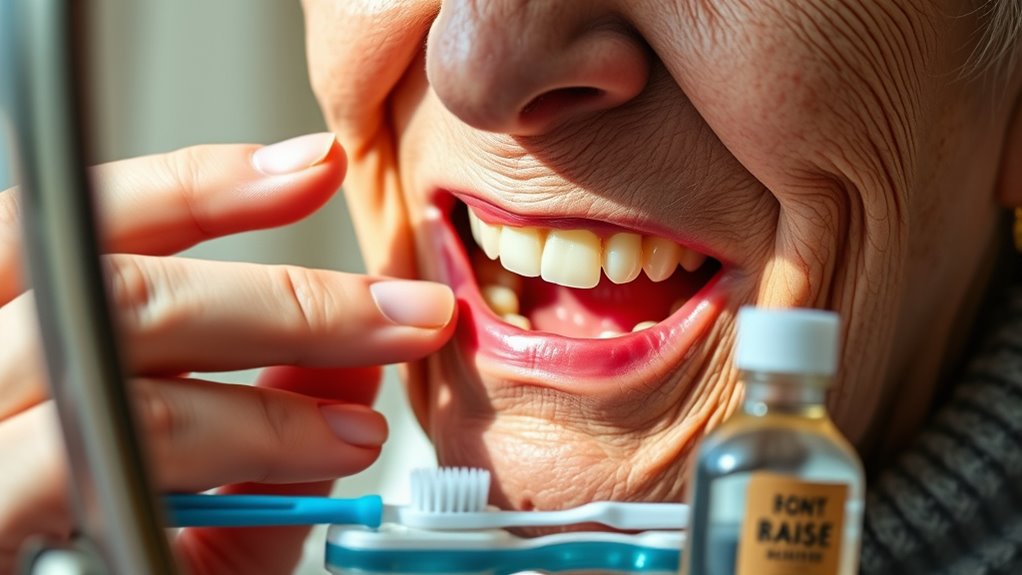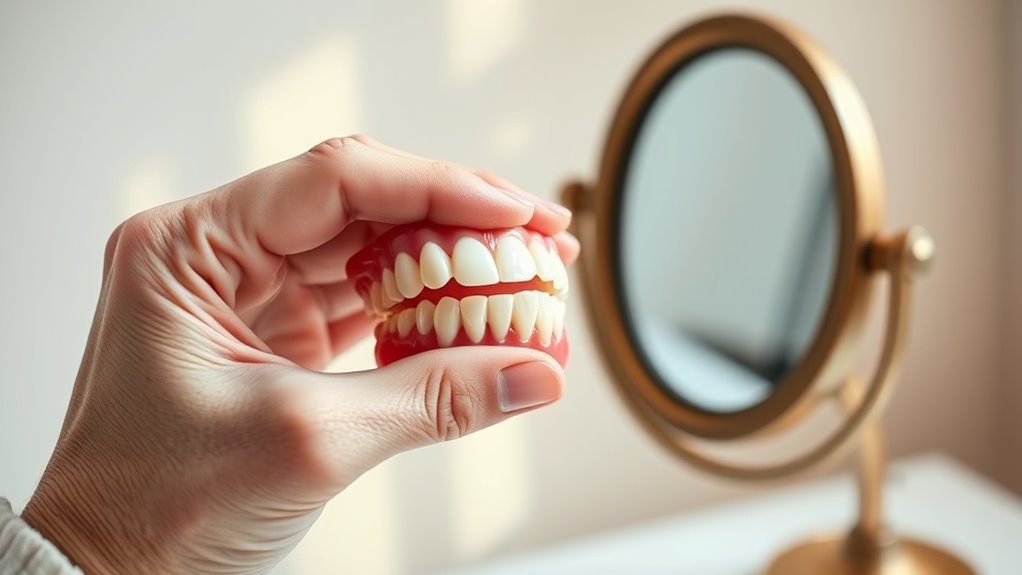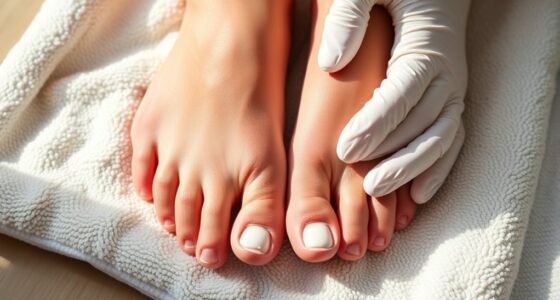Maintaining good oral health is essential as a senior. You should brush with fluoride toothpaste daily, floss carefully, and visit the dentist regularly for checkups. If you wear dentures, keep them clean and fit properly to prevent infections. Pay attention to your gums—look for signs like bleeding or receding—and manage dry mouth with water or saliva substitutes. Staying on top of these habits helps you stay comfortable and confident; there’s more to discover to keep your smile healthy.
Key Takeaways
- Maintain daily brushing with fluoride toothpaste and flossing to prevent decay and gum disease.
- Clean and fit dentures properly to avoid bacterial and fungal infections.
- Monitor gum health for signs of recession or bleeding; seek professional care if needed.
- Manage dry mouth with water, saliva substitutes, and good hydration to reduce decay risk.
- Schedule regular dental checkups for early detection and professional cleaning of teeth and dentures.

Maintaining good oral health is essential for seniors to enjoy overall well-being and quality of life. As you age, your mouth undergoes changes that can make you more prone to issues like tooth decay and gum disease. Staying vigilant about your oral hygiene routines can markedly reduce these risks. Tooth decay is one of the most common problems seniors face, often caused by the buildup of plaque—a sticky film of bacteria that forms on your teeth. When plaque isn’t regularly removed through proper oral hygiene, it produces acids that erode tooth enamel, leading to cavities. These cavities can cause discomfort, sensitivity, and even tooth loss if left untreated. To prevent this, you need to prioritize brushing twice a day with fluoride toothpaste, flossing daily, and visiting your dentist regularly for checkups and cleanings. Regular professional cleanings help remove tartar buildup that cannot be eliminated by brushing alone.
Good oral hygiene prevents cavities, tooth loss, and maintains overall health in seniors.
Good oral hygiene doesn’t just involve brushing and flossing; it also means being mindful of what you eat and drink. Limit sugary foods and beverages, as they fuel the bacteria that cause tooth decay. Instead, incorporate a balanced diet rich in vitamins and minerals, especially calcium and vitamin D, which strengthen your teeth and bones. Staying hydrated is equally important because saliva helps neutralize acids and wash away food particles and bacteria. If you wear dentures, keep them clean and properly fitted. Poorly maintained dentures can harbor bacteria and fungus, leading to infections and bad breath.
As you age, your gums may become more fragile or recede, exposing tooth roots and increasing sensitivity. Gum health is pivotal in preventing periodontal disease, which can contribute to tooth loss and other health problems like heart disease. Regular brushing and flossing help remove bacteria along the gum line, preventing inflammation and bleeding. If you notice your gums bleeding or receding, don’t ignore these signs; schedule a dental appointment promptly. Your dentist may recommend deep cleanings or other treatments to restore gum health.
For seniors, maintaining oral hygiene also involves being aware of dry mouth, which can occur due to medications or health conditions. A dry mouth reduces saliva production, making it easier for bacteria to grow and cause decay. Drinking plenty of water, chewing sugar-free gum, or using saliva substitutes can help keep your mouth moist. Additionally, dental equipment such as electric toothbrushes can enhance plaque removal and make daily routines easier. Overall, taking small but consistent steps to care for your teeth and gums can make a big difference in preventing tooth decay, gum disease, and other oral health issues, helping you enjoy a healthier, more comfortable life.
Frequently Asked Questions
How Often Should Seniors Visit the Dentist for Routine Checkups?
You should visit the dentist for routine checkups at least twice a year, but your dental appointment frequency might vary based on your oral health needs. Regular visits help with oral health monitoring, catching issues early, especially as you age. Stay proactive by following your dentist’s recommendations, and don’t skip checkups, even if your mouth feels fine. Consistent dental care keeps your smile healthy and prevents future problems.
What Are Signs of Oral Infections in Seniors?
Think of your mouth as a busy city that needs attention. Signs of infection include persistent oral discomfort, swelling, redness, or bleeding gums. You might notice a bad taste or foul odor, or small sores that don’t heal. If you see these signs, don’t ignore them—early detection helps prevent serious issues. Regular checkups and paying attention to your oral health keep your mouth thriving and infection-free.
Can Seniors Safely Use Dental Floss or Mouthwash?
You might wonder if flossing safety and mouthwash ingredients are appropriate for seniors. Generally, seniors can safely use dental floss if they’re gentle and avoid snapping it into the gums. When choosing mouthwash, look for alcohol-free options with gentle ingredients to prevent irritation. Always consult your dentist to ensure these products fit your specific needs, especially if you have sensitive gums or other oral health concerns.
How Do Medications Affect Seniors’ Oral Health?
Irony strikes as medications meant to heal can silently harm your oral health. You might take oral health medications for dry mouth or infections, but their side effects often include dry mouth, gum irritation, or altered taste. These medication side effects weaken your teeth and gums, making you more prone to decay and infections. Stay vigilant, ask your doctor about side effects, and maintain good oral hygiene to protect your smile.
Are There Specific Diets to Improve Senior Oral Health?
You should focus on nutrition plans that boost your oral health by including plenty of calcium, vitamin D, and phosphorus to strengthen teeth and gums. Incorporate dietary supplements if needed, especially if your diet lacks essential nutrients. Avoid sugary snacks and acidic drinks, which can harm your teeth. Eating crunchy fruits and vegetables also stimulates saliva production, helping protect your mouth. This balanced approach supports healthier teeth and gums as you age.
Conclusion
Taking care of your oral health is like tending a garden—you need consistent attention to keep it thriving. By brushing, flossing, and visiting your dentist regularly, you’re nurturing your smile and preserving your confidence. Remember, your mouth is the gateway to your overall health, so treat it with the care it deserves. Stay proactive, and you’ll enjoy a bright, healthy smile that blossoms for years to come. Your future self will thank you for the effort today.









